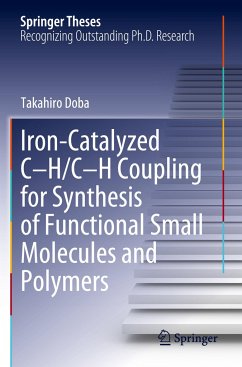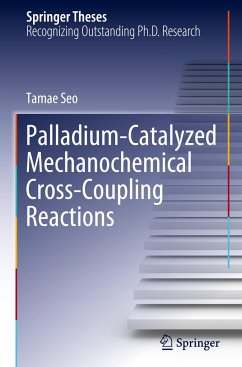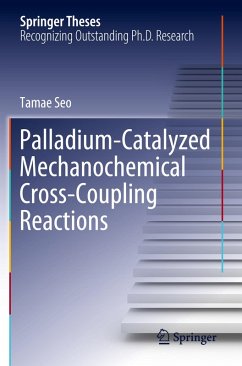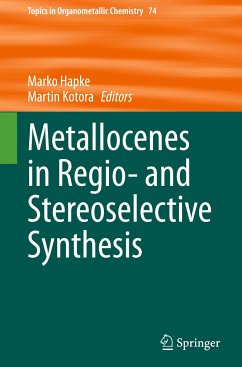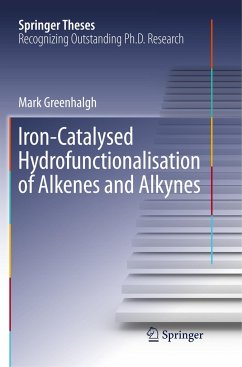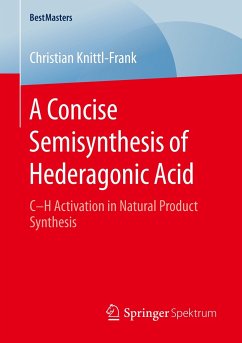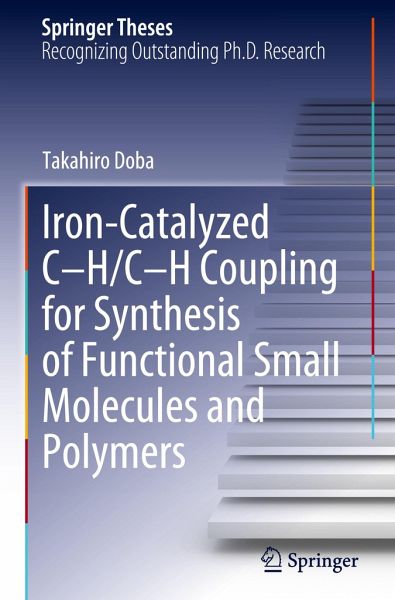
Iron-Catalyzed C-H/C-H Coupling for Synthesis of Functional Small Molecules and Polymers
Versandkostenfrei!
Versandfertig in 6-10 Tagen
136,99 €
inkl. MwSt.
Weitere Ausgaben:

PAYBACK Punkte
68 °P sammeln!
This thesis describes the development of iron-catalyzed thienyl C-H/C-H coupling. This is applied to the synthesis of highly conjugated and electron-rich thiophene compounds of interest in materials science by utilization of low redox potential of iron in combination with a mild oxalate oxidant.Transition-metal-catalyzed C(sp2)-H/C(sp2)-H coupling has attracted much attention as one of the most straightforward methods to construct C(sp2)-C(sp2) bonds. However, application of this ideal transformation to the synthesis of redox-sensitive pi-materials was hindered by the requirement of a strong o...
This thesis describes the development of iron-catalyzed thienyl C-H/C-H coupling. This is applied to the synthesis of highly conjugated and electron-rich thiophene compounds of interest in materials science by utilization of low redox potential of iron in combination with a mild oxalate oxidant.
Transition-metal-catalyzed C(sp2)-H/C(sp2)-H coupling has attracted much attention as one of the most straightforward methods to construct C(sp2)-C(sp2) bonds. However, application of this ideal transformation to the synthesis of redox-sensitive pi-materials was hindered by the requirement of a strong oxidant for catalyst turnover. This limitation originates primarily from the large redox potential of conventional transition-metal catalysts such as palladium and rhodium.
This thesis shows that the efficiency of C-H activation was significantly improved by introduction of a new conjugated tridentate phosphine ligand, giving direct access to polymeric thiophene materials from simple thiophene monomers. Considering the importance of environmentally friendly organic synthesis in terms of UN Sustainable Development Goals, the reactions described herein highlight the potential of iron, the most abundant transition-metal on earth, for the direct synthesis of functional small molecules and polymers of importance in energy device applications.
Transition-metal-catalyzed C(sp2)-H/C(sp2)-H coupling has attracted much attention as one of the most straightforward methods to construct C(sp2)-C(sp2) bonds. However, application of this ideal transformation to the synthesis of redox-sensitive pi-materials was hindered by the requirement of a strong oxidant for catalyst turnover. This limitation originates primarily from the large redox potential of conventional transition-metal catalysts such as palladium and rhodium.
This thesis shows that the efficiency of C-H activation was significantly improved by introduction of a new conjugated tridentate phosphine ligand, giving direct access to polymeric thiophene materials from simple thiophene monomers. Considering the importance of environmentally friendly organic synthesis in terms of UN Sustainable Development Goals, the reactions described herein highlight the potential of iron, the most abundant transition-metal on earth, for the direct synthesis of functional small molecules and polymers of importance in energy device applications.



